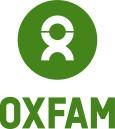

INTEGRITY AT OXFAM
A MESSAGE FROM AMITABH BEHAR
The release of the Oxfam Integrity Report is a significant milestone in our annual calendar. It is a statement of our commitment to upholding the highest moral and ethical standards in our fight against inequality to end poverty and injustice.
The last year has been characterized by a polycrisis, a situation where multiple occurrences of catastrophic events, with their compounded effects, create a challenge of global proportions. These events range from wars, diseases, disasters, and displacement crises to severe humanitarian challenges in Africa, Europe, and the Middle East. At the same time, climate crisis remains a significant threat to food security and health, with 2024 being declared the hottest year on record.
The resultant economic, humanitarian, and environmental crises have called for interventions in the 77 countries in which Oxfam works with local communities, allies, and partners to create lasting solutions to poverty. In all these countries, we strive to create a safe and inclusive working environment where everyone feels protected and able to address integrity and safeguarding concerns.
I invite you to read this latest edition of the Oxfam Integrity Report. It covers our work between 1 October 2023 and 30 September 2024. We have for the first time taken the broader concept of Integrity to create a unified story about our work and commitment. We will continue to uphold the highest standards as our operating environment evolves.
Amitabh Behar Executive Director Oxfam International

INTRODUCTION
Integrity and accountability are at the heart of Oxfam’s work. For Oxfam, integrity means the measures we take to prevent fraud, corruption, misconduct or abuse and exploitation, including sexual exploitation, sexual abuse, and sexual harassment, and immediately and appropriately responding to concerns.
This report provides a snapshot of our key areas of progress and impact made between October 2023 and September 2024. It reflects how integrity principles are embedded across our organization, shaping our culture, operations, and relationships with staff, partners, and communities. We are continually learning from our partners about risks and risk mitigation.
2. STRENGTHENING STAFF AWARENESS, SAFETY, AND ENGAGEMENT
A core theme this year was reinforcing a culture of integrity through engagement and training of Oxfam staff in affiliates, countries, clusters, regions, and at the Oxfam Secretariat. Across regions, we launched initiatives to enhance awareness and create a safe environment where integrity-related concerns could be raised. It is essential to share with staff the tools and knowledge to navigate ethical dilemmas, prevent misconduct, and protect those we work with. This commitment is reflected in targeted efforts such as global training programs, innovative learning tools, strengthened reporting mechanisms, and the promotion of a ‘speak up’ culture.
• Global training and engagement: Staff in affiliates participated in safeguarding, anticorruption, and ethical decision-making training. Some affiliates, including Oxfam America and Oxfam Canada, achieved a 100% compliance rate in mandatory safeguarding training Oxfam Novib (Oxfam in the Netherlands) introduced an Ethical Dilemma Game to encourage discussion about real-world integrity challenges. The game facilitated open conversations across teams, with 70% of units actively participating and over 200 staff members engaging in discussions on ethical issues.
• Promoting a ‘speak up’ culture: Oxfam Great Britain saw a 15% increase in reported cases following a comprehensive anti-corruption training, while its relaunched ‘Integrity Insights’ newsletter saw an 800% increase in readership. In the Pacific and the Philippines, workshops brought together ‘safeguarding focal points’ (points of contact who advise, support and help coordinate Oxfam’s safeguarding work) to strengthen case management skills and promote peer learning.
• Increased safeguarding support: Oxfam in Colombia, which has worked with safeguarding focal points for some time, has now strengthened its capacity by appointing a full-time Safeguarding Officer. In the Middle East and North Africa (MENA) region, efforts to strengthen safeguarding have also progressed, with Syria and Palestine each recruiting a full-time safeguarding staff member, complementing the Safeguarding Coordinator role in Yemen.
• Leveraging wellbeing and support: Oxfam Aotearoa (Oxfam New Zealand) integrated decolonization, feminist leadership, and inclusion into its integrity framework, with a 100% staff engagement rate in its positive culture survey. Across the Oxfam confederation,

employees expressed increased confidence in Oxfam's approach, with 72% agreeing that the organization prioritizes diversity and inclusion.
3. STRENGTHENING INTEGRITY AMONG PARTNERS AND NETWORKS
Beyond internal efforts, Oxfam reinforced integrity in partnerships and humanitarian programming, ensuring safer working environments across the communities we serve and people who come into contact with our work. It is crucial that our partners, suppliers, and networks uphold the same ethical standards. Strengthening integrity in these spaces requires capacity building, innovative reporting mechanisms, and proactive measures to prevent misconduct. This year we focused on sharing with partners integrity knowledge, tackling workplace harassment, and developing community-driven solutions to enhance accountability.
• Capacity strengthening with partners: In the Middle East and North Africa (MENA) region, we initiated open discussions with partner organization leaders based on the findings from partnership assessments. This facilitated organizations with weaker safeguarding practices in adopting safer cultures and systems, starting with the assignment of safeguarding focal points.
In South Sudan, Oxfam delivered training alongside nine partner organizations on safeguarding, leading to an increase in understanding of reporting mechanisms. In Colombia, eight partner organizations and 51 suppliers received safeguarding training, ensuring that integrity measures extend across all operational touchpoints. Oxfam Great Britain trained 23 seasonal festival coordinators in safeguarding, further embedding ethical standards in event planning. Within the Southern Africa cluster, safeguarding consultations and awareness sessions were held with 20 partner organizations on integrating safeguarding in programs and operations.
• Tackling workplace harassment: Oxfam Italy expanded its Teamwork Project, an initiative addressing workplace harassment, reaching 95 professionals and 21 organizations with tailored safeguarding policies and support services. This initiative, conducted in partnership with labor unions provided listening and response services for survivors while equipping organizations with tools to prevent misconduct.
• Innovative reporting mechanisms: In South Sudan, Oxfam piloted a digital safeguarding reporting system for all its stakeholders, integrated into community feedback mechanisms to enhance case management efficiency and confidentiality. The system was introduced to complement existing mechanisms of reporting misconduct with particular focus on community feedback mechanisms.
• Community-centered initiatives: In the Latin America and the Caribbean region (LAC) a ‘Safeguarding Olympics’ engaged 80 staff members in interactive learning about power and privilege, using Artificial Intelligence tools. Feedback from participants highlighted the effectiveness of an innovative approach to understanding safeguarding responsibilities.

4. POLICY STRENGTHENING AND INNOVATION
Oxfam advanced its strategic policy framework to ensure consistent integrity standards across the confederation. In the face of evolving global challenges, we focused on strengthening safeguarding, anti-corruption measures, and financial integrity to reinforce ethical practices across all levels of our operations. These efforts included a refreshed unified safeguarding strategy, introducing regioninnovations, and enhancing financial oversight to mitigate risks and uphold trust in our work.
• Oxfam Safeguarding Strategy 2024–28: This initiative established a One Oxfam safeguarding approach across affiliates and country and cluster offices, with tailored implementation plans developed in the Democratic Republic of Congo, Ethiopia, South Sudan and Uganda. The strategy outlines a clear vision and benchmarks for monitoring safeguarding progress and strengthening local practices.
• In the Latin America and the Caribbean (LAC) region, we introduced a Safeguarding Manual, equipping focal points with practical tools for handling reports with survivor-centered care. The manual, developed collaboratively with safeguarding experts, provides clear protocols for escalating cases and provides survivor-centered response strategies.
• In MENA, we identified gaps in the available resources supporting the implementation and understanding of safeguarding at the country level. To address these, we developed several guidelines, including:
o Guidelines for assigning in-country safeguarding focal points.
o Safeguarding FAQs specific to MENA.
o Guidelines on embedding safeguarding in proposals.
• Countries in MENA also strengthened their coordination with the local Protection from Sexual Exploitation and Abuse (PSEA) network, fostering better understanding and collaboration at national levels.
• Anti-corruption and financial integrity: We are revising our Anti-Terrorism Financing Policy to balance compliance with ethical considerations, ensuring that financial integrity remains a cornerstone of Oxfam’s operations. Staff across regions participated in anti-corruption capacity-building sessions, strengthening financial oversight and risk mitigation.
5. SAFEGUARDING IN HUMANITARIAN AND DEVELOPMENT PROGRAMMING
Integrity in program delivery remains a top priority, particularly in conflict- and disaster-affected areas where the external context increases safeguarding risks. Operating in these environments requires proactive measures to prevent exploitation, abuse, and misconduct while ensuring that those we serve can access aid safely and with dignity. This year, Oxfam strengthened safeguarding within humanitarian responses, enhanced gender justice initiatives, and improved reporting mechanisms to build safer, more accountable programs.
• Humanitarian response in Southern Africa: In response to the El Niño-induced drought, safeguarding was integrated into humanitarian work, ensuring that over 246,000 people received assistance in a manner that prioritized their safety and dignity. We trained

community champions to raise awareness about reporting mechanisms, contributing to an increase in safeguarding case reports.
• Gender justice and protection: In Mozambique’s Cabo Delgado region, we conducted safeguarding risk assessments to understand challenges faced by marginalized groups, particularly women and girls. This data informed program adjustments to enhance protection and trust-building within communities.
• Oxfam took on the role of chairing the Safeguarding Task Force in Gaza under the broader Protection from Sexual Exploitation and Abuse (PSEA) network in Palestine.
6. LOOKING AHEAD
Oxfam has made significant progress in embedding integrity into its ways of working, strengthening trust and accountability across the confederation. Looking ahead, sustaining and deepening this commitment will require continuous learning, innovation, and resilience in the face of both persistent and emerging challenges.
Integrity risks remain heightened in complex and fragile contexts, such as large-scale emergencies, where Oxfam continues to operate at scale. These environments demand agile and context-sensitive approaches to risk management and prevention. At the same time, evolving challenges – such as digital safeguarding risks, the ethical use of AI, financial pressures, and shifting societal expectations – require us to keep adapting. We are also working to strengthen our frameworks to better reflect the principles of a decolonized aid sector, placing stronger emphasis on equitable partnerships and shared accountability with local actors.
Our case data suggests that these ongoing efforts are yielding tangible results. Increased reporting and early detection appear linked to our targeted awareness-raising campaigns and expanded staff training. Similarly, reductions in certain types of misconduct, such as procurement-related incidents, align with our rollout of new training modules and revised procedures. These trends suggest that proactive investments in integrity are having a positive impact – both in prevention and in building trust in our systems.
In the coming year, Oxfam will build on this progress by:
• Expanding safeguarding and integrity training, using scenario-based e-learning and locally adapted materials to engage staff, partners, and suppliers more effectively.
• Enhancing reporting and case management systems, with a focus on accessibility, responsiveness, and survivor-centered support.
• Developing context-specific risk management approaches, particularly for high-risk environments and rapid-onset emergencies.
• Strengthening policy frameworks, including guidance on digital safeguarding and ethical use of technology.
• Deepening collaboration with partners, co-creating tools and processes that reflect local realities and promote mutual accountability.

Through these efforts, Oxfam reaffirms its determination to lead with integrity – embedding it not only in policies and systems but actively living it in practice across all aspects of our work.
7. TREND ANALYSIS: SAFEGUARDING CASE DATA
Oxfam is committed to transparency and accountability in how we manage integrity-related concerns. Sharing this data helps build trust and supports sector-wide learning. However, to protect the safety, dignity, and confidentiality of those involved, we limit the level of detail shared publicly. The following figures reflect the cases reported and managed during the reporting period across safeguarding, fraud, corruption, and other misconduct. While we strive for accuracy and completeness, some variations may occur due to ongoing investigations or classification adjustments.
While case numbers provide a useful indication of Oxfam’s response efforts, they offer only a partial view – failing to capture the human, contextual, and psychosocial dimensions that give real meaning to the complexity and impact of each case. Despite these limitations, they remain the most practical tool currently available to represent and track our work at scale
SAFEGUARDING CASES (see chart below)
Closed cases are concerns that were reviewed, investigated, and an outcome agreed and acted on. The numbers refer to the safeguarding cases concluded or finalized, either with recommendations made or different actions taken.
The number of closed cases has averaged around 131.33 in this time period.


MISCONDUCT TYPES
(see chart below)
Categories of misconduct include sexual abuse, sexual exploitation, and sexual harassment. Any case that involves a child (irrespective of the category of misconduct) is labeled as child abuse. Nonsafeguarding-related concerns, such as those about inappropriate conduct related to Oxfam’s Code of Conduct, or Conflict of Interest, are classified as ‘other.’
The two most frequently reported categories over the past three years have been ‘other’ and sexual harassment. Sexual abuse cases have consistently been the lowest reported, while reports of sexual exploitation have shown a downward trend. For child abuse, no clear pattern has emerged.
While these data points provide some insight into the types of concerns being reported, the relatively low numbers and short reporting period make it difficult to draw firm conclusions about long-term trends or overall prevalence. Interpretation of these figures should therefore be made with caution, recognizing the many factors that can influence reporting rates – such as awareness-raising efforts, trust in reporting systems, organizational culture, and external events.
Empirical research shows that both increases and decreases in reporting can have multiple explanations. A rise in reports may reflect growing awareness and trust, but it may also signal emerging risks or systemic issues. Similarly, low reporting may indicate underreporting rather than the absence of misconduct. Without deeper contextual analysis and longer-term data, it is not possible to determine the underlying drivers with certainty.
Oxfam remains committed to strengthening its safeguarding culture by investing in prevention, response, and survivor support, while continuing to improve our capacity for contextual analysis and learning over time. We also actively utilize the data we have, to inform our ways of working, ensuring that each case concludes with documented learning points to strengthen future practice and reduce the risk of recurrence.
Safeguarding misconduct types per year

OUTCOMES OR ACTIONS TAKEN
(see chart below)
The majority of concerns were not taken forward after a preliminary review. Preliminary reviews are an essential part of the case management process, ensuring that all concerns are appropriately assessed before determining next steps. This includes an initial examination to establish whether a concern falls within the scope of our safeguarding framework. For example, concerns that are clearly unrelated to safeguarding or do not meet the threshold for investigation may be categorized as under preliminary review. This does not necessarily mean that they were ‘not upheld;’ rather, they may not have proceeded to full investigation due to lack of sufficient information or relevance. Case closure following a preliminary review is not a decision taken to make concerns ‘go away’ without appropriate care and consideration. Instead, it reflects a reasoned outcome based on the available evidence and facts, in line with Oxfam’s case management procedures and standards.
There was an upward trajectory of concerns being referred to other teams within Oxfam (Anti-Fraud and Corruption or HR teams, for example), when the matter related to non-sexual misconduct such as bullying or fraud. The cases not upheld show an upward trend, while those with insufficient evidence have decreased.
The number of dismissals (terminated from post) decreased from 11 in Year 2 to 1 in Year 3, while non-disciplinary outcomes dropped from 8 to 2 over the same period. Disciplinary actions remained stable across both years. It is important to note, however, that the absolute numbers remain low, limiting the ability to draw broader conclusions from these shifts.
Instances where the notifier did not wish to take the case forward dropped from Year 1 to Year 2 but then remained stable for Years 2 and 3.
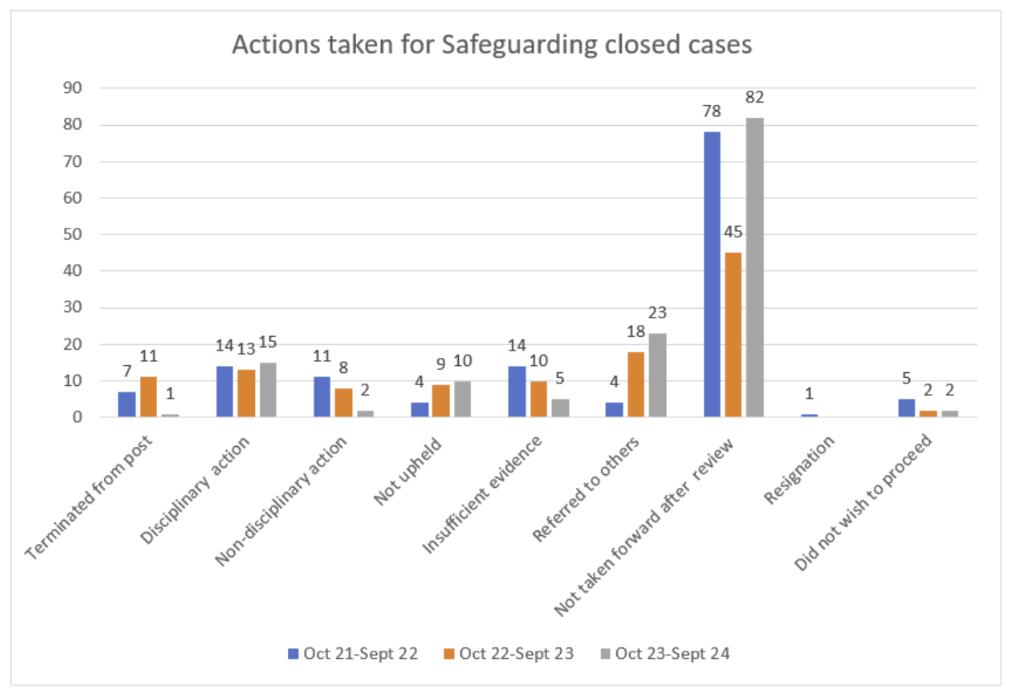

8. TREND ANALYSIS: FRAUD AND CORRUPTION CASE DATA
FRAUD AND CORRUPTION CASES (see chart below)
These numbers refer to the volume of concerns received by the Fraud and Corruption teams that were applicable for review with consequential decisions.
The number of closed cases averaged around 155 reports per year in the last three years, ending October 2024. In 2022, we had an above-average number of concerns as colleagues returned to offices after almost two years of working from home due to Covid-19 pandemic. Cases in the last reporting period appear to have returned to around the previous average caseload.
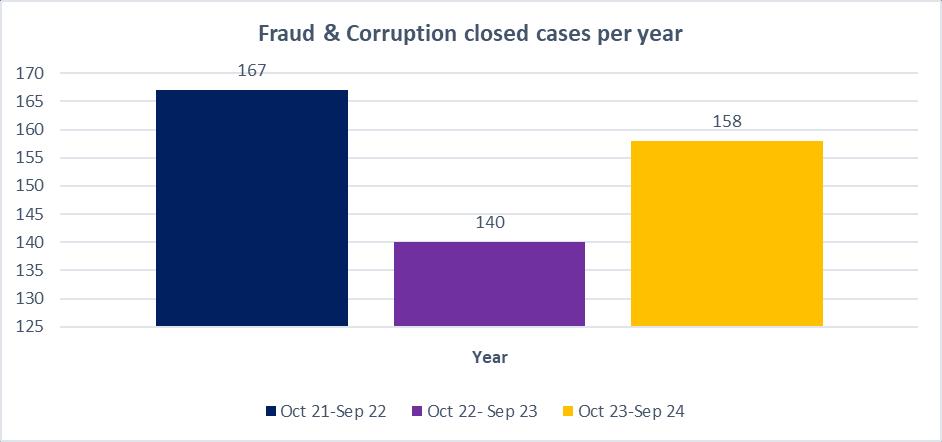
FRAUD AND CORRUPTION TYPES (see chart below)
Cases are categorized in the system based on our Anti-Fraud and Corruption policy definitions as bribery, undeclared conflict of interest (COI), fraud, terrorist financing, nepotism, theft, and others.
Below is a brief definition of these categorizations. For further details, please refer to Anti-Fraud and Corruption policy in the link here
Bribery Offering, promising, giving, or accepting any financial or other advantage with the intention to influence someone to improperly act.
Fraud Encompasses acts of deception to dishonestly deprive another person or entity of money, property, or a service.
Undeclared COI A situation in which a person’s loyalties or interests are (perceived to be or might be) in conflict with those of the organization.
Terrorist
Financing1 Refers to terrorist financing, sanctions, money laundering and export control regulations.
Nepotism Nepotism is favoritism granted to associates regardless of merit.
1 Terrorism financing falls outside the scope of our Oxfam’s Anti-Fraud Corruption Policy but is addressed through our broader misconduct reporting mechanism, which is why it is reported here. However, 'terrorism financing' does not fully capture the range of financial and regulatory risks we monitor – including sanctions violations, money laundering, and export control breaches. We are therefore working to adopt a more accurate and comprehensive umbrella term to reflect this broader scope.

Theft Dishonestly taking / appropriating property belonging to another, with the intention of permanently depriving them of it.
Other Incidents not classified as per the above categorizations; could be malicious reporting, questionable incidents, or referral to other parties as incidents are outside the mandate of the fraud and corruption team.
The category with the highest number of cases is Fraud.
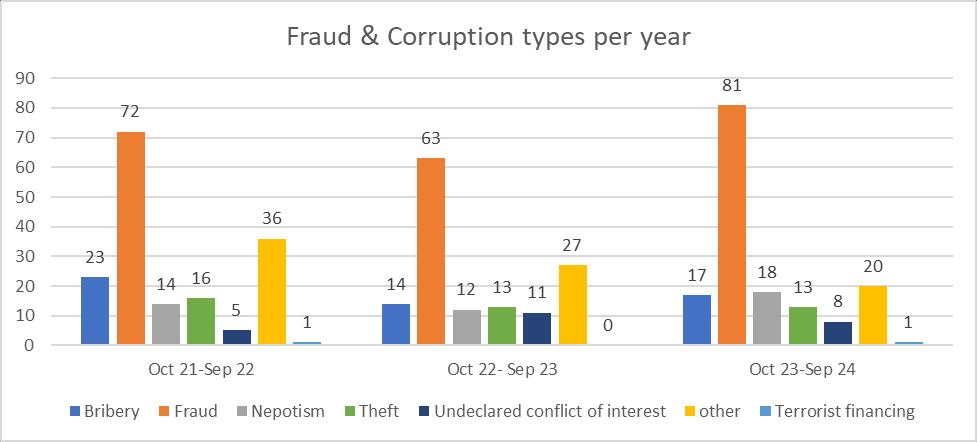
OUTCOMES OR ACTIONS TAKEN (see chart below)
When a concern is received, a preliminary assessment is carried out with the purpose of deciding whether a formal investigation is necessary or if no further action is required; in the latter scenario, the concern is logged for information only or referred to another department. An outcome can be a corrective action to our internal control structure. This ensures that gaps are not exploited and helps make us stronger and more resilient.
A number of cases are closed because of insufficient evidence for investigation; those incidents are kept in the system and managers informed of any weaknesses in controls that need to be tightened. A number of incidents end up with either termination of employment, written warning, or other disciplinary action.
The processes of prevention, detection, and response are our core pillars to fight fraud and corruption as we also continue to do more work on training and raising awareness.

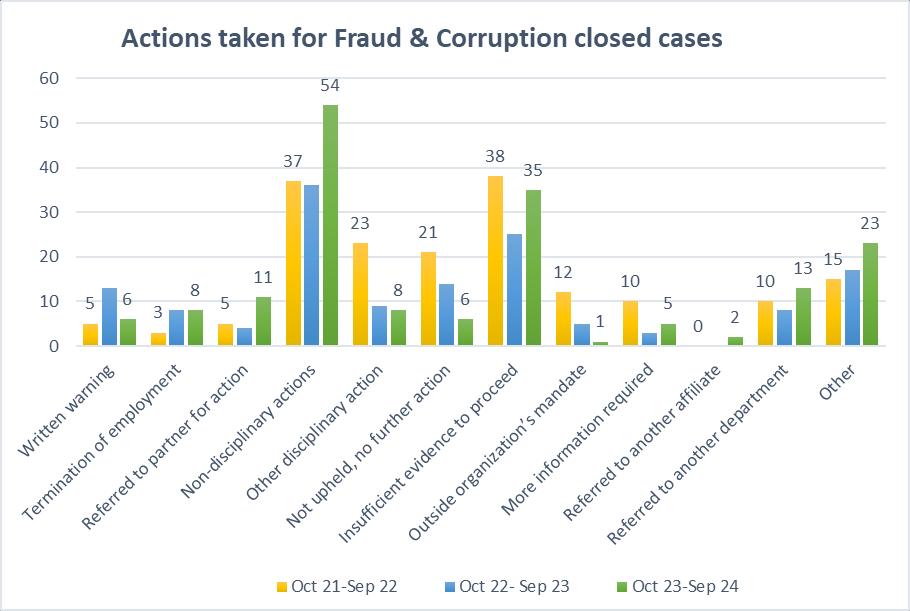
CONCLUSION
We remain steadfast in our commitment to integrity across all areas of our work. To learn more about Oxfam’s integrity efforts, please visit our website. We encourage all Oxfam staff and partners to report any concerns related to policy violations or to provide feedback on how we can strengthen our integrity work. This can be done through our externally accessible Speak Up webform.
Recognizing that we operate primarily through partnerships, we place a strong emphasis on improving the delivery and effectiveness of integrity and safeguarding within and alongside our partners. This ongoing reflection shapes how we support ethical, accountable collaboration across the communities we serve.
